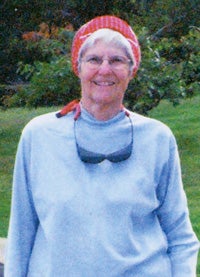Carol Anderson Opochinsky ’58
Above the Arctic Circle

To cap a career with migration to Florida is so commonplace as to be a cliché. To “retire” to the Canadian Arctic? That’s unique.
In 2005, after retiring from university teaching in Manitoba, Canada, Carol Anderson Opochinsky fulfilled a long-held desire to work in the Arctic. A psychiatric nurse-clinician with a master’s degree in philosophy, she began work as a mental health nurse in Canada’s Nunavut Territory.
Communities are accessible only by air, with supply ships in summer. Opochinsky has traveled seven times to five communities, two above the Arctic Circle. Her duties include assessments, a broad range of therapeutic interventions, medication management, consultation, and health education
“The North exerts a huge draw. It is just beautiful,” she said. “The land is harsh, and yet it isn’t. For example, colors are subtle in winter as the snow takes on the changing tint of the sky.”
The people are similarly striking. Opochinsky describes them as “bright, competent, resilient, witty, and warm.” They are also beset by serious problems, with grief, sorrow and questions about how they are supposed to live—tragically, the suicide rate has been estimated at seven times the national average.
Historically a nomadic people, the Inuit have had to contend with imposed settlement in communities, erosion of traditional means of livelihood, and the increasing impact of technology. In tandem, these changes have had a seismic effect. “Within one or two generations people have experienced one whole way of life being displaced by another.” However, they are actively working to meet modern demands while retaining traditional values, skills, and ties to the land.
Opochinsky credits the URI five-year nursing program with its academic courses and solid nursing preparation for providing the background for the work she has done. She hopes to continue in the Arctic, braving “blizzards and wind-chills of -60°C.” While she brings a needed service, she says that like others, she has benefited in many ways from getting to know the Inuit people.
—Marybeth Reilly-McGreen
 Home
Home Browse
Browse Close
Close Events
Events Maps
Maps Email
Email Brightspace
Brightspace eCampus
eCampus


